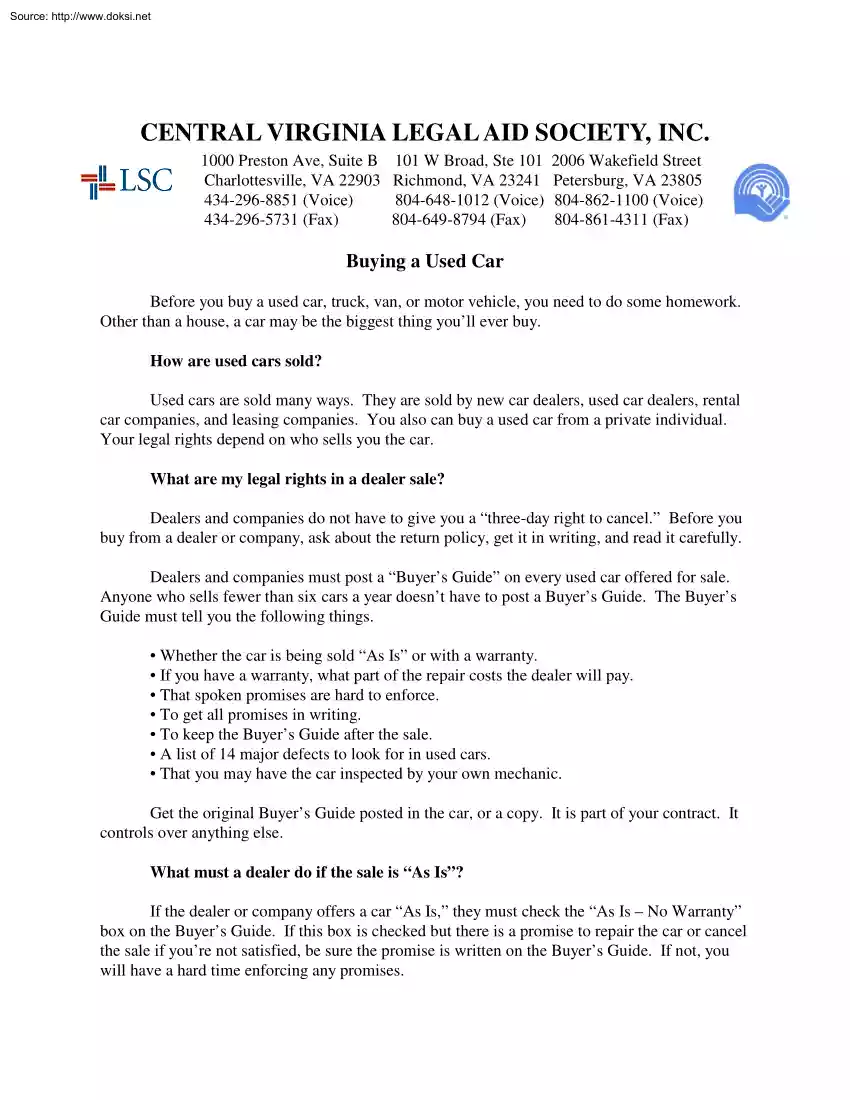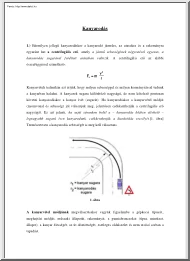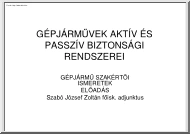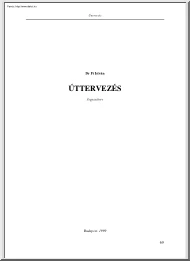Datasheet
Year, pagecount:2012, 4 page(s)
Language:English
Downloads:3
Uploaded:September 26, 2019
Size:476 KB
Institution:
-
Comments:
Attachment:-
Download in PDF:Please log in!
Comments
No comments yet. You can be the first!Most popular documents in this category
Content extract
Source: http://www.doksinet CENTRAL VIRGINIA LEGAL AID SOCIETY, INC. 1000 Preston Ave, Suite B Charlottesville, VA 22903 434-296-8851 (Voice) 434-296-5731 (Fax) 101 W Broad, Ste 101 Richmond, VA 23241 804-648-1012 (Voice) 804-649-8794 (Fax) 2006 Wakefield Street Petersburg, VA 23805 804-862-1100 (Voice) 804-861-4311 (Fax) Buying a Used Car Before you buy a used car, truck, van, or motor vehicle, you need to do some homework. Other than a house, a car may be the biggest thing you’ll ever buy. How are used cars sold? Used cars are sold many ways. They are sold by new car dealers, used car dealers, rental car companies, and leasing companies. You also can buy a used car from a private individual Your legal rights depend on who sells you the car. What are my legal rights in a dealer sale? Dealers and companies do not have to give you a “three-day right to cancel.” Before you buy from a dealer or company, ask about the return policy, get it in writing, and read it carefully.
Dealers and companies must post a “Buyer’s Guide” on every used car offered for sale. Anyone who sells fewer than six cars a year doesn’t have to post a Buyer’s Guide. The Buyer’s Guide must tell you the following things. • Whether the car is being sold “As Is” or with a warranty. • If you have a warranty, what part of the repair costs the dealer will pay. • That spoken promises are hard to enforce. • To get all promises in writing. • To keep the Buyer’s Guide after the sale. • A list of 14 major defects to look for in used cars. • That you may have the car inspected by your own mechanic. Get the original Buyer’s Guide posted in the car, or a copy. It is part of your contract It controls over anything else. What must a dealer do if the sale is “As Is”? If the dealer or company offers a car “As Is,” they must check the “As Is – No Warranty” box on the Buyer’s Guide. If this box is checked but there is a promise to repair the car or
cancel the sale if you’re not satisfied, be sure the promise is written on the Buyer’s Guide. If not, you will have a hard time enforcing any promises. Source: http://www.doksinet In Virginia, if a dealer sells a car “As Is,” they must give you another statement about an As Is sale. This must be on the front of your buyer’s order It must say the following things “I understand that this vehicle is being sold AS IS with all faults and is not covered by any dealer warranty. I understand that the dealer is not required to make any repairs after I buy this vehicle I will have to pay for any repairs this vehicle will need.” In an “As Is” sale, if you do not get the AS IS statement on the front of your buyer’s order, and do not get the Buyer’s Guide, you have 30 days to cancel the sale. In this case, you may return the car and get back most of the payments you made. What must a dealer do if the sale is not “As Is”? If you do not get the AS IS statement on the
front of your buyer’s order, and do not get the Buyer’s Guide, the dealer has given you an “implied warranty.” This is an unspoken and unwritten promise from the seller to the buyer. There is no set time period for an implied warranty. What types of implied warranties are there? The most common implied warranty is the “warranty of merchantability.” This is a promise that the product will do what it is supposed to do. This promise applies to the basic functions of a car. It does not cover everything that could go wrong Problems after the sale don’t prove the seller didn’t keep the promise of the warranty of merchantability. You must prove the problem existed at the time of sale A less common implied warranty is the “warranty of fitness for a particular purpose.” This occurs when you buy a product based on the seller’s advice it is suitable for a particular use. If you have a written warranty that doesn’t cover your problems, you still may have coverage through an
implied warranty. When a dealer gives you a written warranty, you automatically get the implied warranty. What types of written warranties are there? If you have a written warranty, you may have a full warranty or a limited warranty. Either warranty may cover all or some of the car. Most used car warranties are limited A full warranty means the following things. • Anyone who owns the car during the warranty period may get warranty service. • Warranty service is free. • If the car cannot be fixed after a reasonable number of times, you may get a replacement or refund. Source: http://www.doksinet If any of these statements doesn’t apply, you have a limited warranty. A limited warranty must tell you the following things. • The portion of the repair costs for parts that the dealer will pay. • The portion of the repair costs for labor that the dealer will pay. • The parts and systems of the car that are covered. • The time or mileage limit for each covered system. For
example, 30 days or 1,000 miles, whichever comes first. • Whether there is a deductible, and if so, how much. Does the inspection certificate give me any legal rights? In Virginia, a dealer must have a current motor vehicle inspection certificate before selling a used car. However, the inspection certificate does not create a warranty A dealer who does not have the inspection certificate may have broken the law. However, this may not give you any legal rights. What are my legal rights in a private sale? You also can buy a used car from an individual. Private sellers usually don’t have to use the Buyer’s Guide. Private sales usually do not come with implied warranties Most private sales are “as is.” What should I do when I buy a used car? Whether you buy a used car from a dealer or an individual, learn as much as you can about the car before you buy. Follow these tips • Look closely at the inside and outside of the car. • Use an inspection checklist. • Test drive the car
under varied road conditions. Test drive on hills, highways and in stop-and-go traffic. • Ask for the car’s maintenance and repair record. • Talk to the prior owner. • Have the car inspected by your mechanic. What are some of the things to look for when buying a used car? Everything. Below is a list of some of the major defects that may occur in used motor vehicles. • Frame & Body. Cracked frame, welds, rust, bent or twisted frame • Engine. Oil leaks, cracked block or head, missing or inoperable belts, knocking, missing, abnormal exhaust discharge. • Transmission & Drive Shaft. Fluid leaks, cracked or damaged case, abnormal noise or vibration, improper shifting or functioning in any gear, manual clutch slips or chatters. Source: http://www.doksinet • Differential. Fluid leaks, cracked or damaged housing, abnormal noise or vibration • Cooling System. Leaks, improperly functioning water pump • Electrical System. Battery leakage, improperly functioning
alternator, generator, battery or starter. • Fuel System. Visible leaks • Inoperable Accessories. Gauges, warning devices, air conditioner, heater, defroster • Brake System. Warning light broken, pedal not firm under pressure, not enough pedal reserve, doesn’t stop vehicle in a straight line, hoses damaged, drum or rotor too thin, lining or pads too thin, power unit not operating or leaking, structural or mechanical parts damaged. • Steering System. Too much free play at steering wheel, free play in linkage, steering gear binds or jams, front wheels not aligned properly, power unit belts cracked or slipping, leaks. • Suspension System. Ball joint seals damaged, structural parts bent or damaged, stabilizer bar disconnected, spring broken, shock absorber mounting loose, rubber bushings damaged or missing, radius rod damaged or missing, shock absorbers leaking or functioning improperly. • Tires. Tread depth less than 1/16th inch, sizes mismatched, visible damage • Wheels.
Cracks, damage or repairs, mounting bolts loose or missing • Exhaust System. Leakage How can I pay for a used car? You can pay for a used car two ways. You can pay in full You also can finance o
Dealers and companies must post a “Buyer’s Guide” on every used car offered for sale. Anyone who sells fewer than six cars a year doesn’t have to post a Buyer’s Guide. The Buyer’s Guide must tell you the following things. • Whether the car is being sold “As Is” or with a warranty. • If you have a warranty, what part of the repair costs the dealer will pay. • That spoken promises are hard to enforce. • To get all promises in writing. • To keep the Buyer’s Guide after the sale. • A list of 14 major defects to look for in used cars. • That you may have the car inspected by your own mechanic. Get the original Buyer’s Guide posted in the car, or a copy. It is part of your contract It controls over anything else. What must a dealer do if the sale is “As Is”? If the dealer or company offers a car “As Is,” they must check the “As Is – No Warranty” box on the Buyer’s Guide. If this box is checked but there is a promise to repair the car or
cancel the sale if you’re not satisfied, be sure the promise is written on the Buyer’s Guide. If not, you will have a hard time enforcing any promises. Source: http://www.doksinet In Virginia, if a dealer sells a car “As Is,” they must give you another statement about an As Is sale. This must be on the front of your buyer’s order It must say the following things “I understand that this vehicle is being sold AS IS with all faults and is not covered by any dealer warranty. I understand that the dealer is not required to make any repairs after I buy this vehicle I will have to pay for any repairs this vehicle will need.” In an “As Is” sale, if you do not get the AS IS statement on the front of your buyer’s order, and do not get the Buyer’s Guide, you have 30 days to cancel the sale. In this case, you may return the car and get back most of the payments you made. What must a dealer do if the sale is not “As Is”? If you do not get the AS IS statement on the
front of your buyer’s order, and do not get the Buyer’s Guide, the dealer has given you an “implied warranty.” This is an unspoken and unwritten promise from the seller to the buyer. There is no set time period for an implied warranty. What types of implied warranties are there? The most common implied warranty is the “warranty of merchantability.” This is a promise that the product will do what it is supposed to do. This promise applies to the basic functions of a car. It does not cover everything that could go wrong Problems after the sale don’t prove the seller didn’t keep the promise of the warranty of merchantability. You must prove the problem existed at the time of sale A less common implied warranty is the “warranty of fitness for a particular purpose.” This occurs when you buy a product based on the seller’s advice it is suitable for a particular use. If you have a written warranty that doesn’t cover your problems, you still may have coverage through an
implied warranty. When a dealer gives you a written warranty, you automatically get the implied warranty. What types of written warranties are there? If you have a written warranty, you may have a full warranty or a limited warranty. Either warranty may cover all or some of the car. Most used car warranties are limited A full warranty means the following things. • Anyone who owns the car during the warranty period may get warranty service. • Warranty service is free. • If the car cannot be fixed after a reasonable number of times, you may get a replacement or refund. Source: http://www.doksinet If any of these statements doesn’t apply, you have a limited warranty. A limited warranty must tell you the following things. • The portion of the repair costs for parts that the dealer will pay. • The portion of the repair costs for labor that the dealer will pay. • The parts and systems of the car that are covered. • The time or mileage limit for each covered system. For
example, 30 days or 1,000 miles, whichever comes first. • Whether there is a deductible, and if so, how much. Does the inspection certificate give me any legal rights? In Virginia, a dealer must have a current motor vehicle inspection certificate before selling a used car. However, the inspection certificate does not create a warranty A dealer who does not have the inspection certificate may have broken the law. However, this may not give you any legal rights. What are my legal rights in a private sale? You also can buy a used car from an individual. Private sellers usually don’t have to use the Buyer’s Guide. Private sales usually do not come with implied warranties Most private sales are “as is.” What should I do when I buy a used car? Whether you buy a used car from a dealer or an individual, learn as much as you can about the car before you buy. Follow these tips • Look closely at the inside and outside of the car. • Use an inspection checklist. • Test drive the car
under varied road conditions. Test drive on hills, highways and in stop-and-go traffic. • Ask for the car’s maintenance and repair record. • Talk to the prior owner. • Have the car inspected by your mechanic. What are some of the things to look for when buying a used car? Everything. Below is a list of some of the major defects that may occur in used motor vehicles. • Frame & Body. Cracked frame, welds, rust, bent or twisted frame • Engine. Oil leaks, cracked block or head, missing or inoperable belts, knocking, missing, abnormal exhaust discharge. • Transmission & Drive Shaft. Fluid leaks, cracked or damaged case, abnormal noise or vibration, improper shifting or functioning in any gear, manual clutch slips or chatters. Source: http://www.doksinet • Differential. Fluid leaks, cracked or damaged housing, abnormal noise or vibration • Cooling System. Leaks, improperly functioning water pump • Electrical System. Battery leakage, improperly functioning
alternator, generator, battery or starter. • Fuel System. Visible leaks • Inoperable Accessories. Gauges, warning devices, air conditioner, heater, defroster • Brake System. Warning light broken, pedal not firm under pressure, not enough pedal reserve, doesn’t stop vehicle in a straight line, hoses damaged, drum or rotor too thin, lining or pads too thin, power unit not operating or leaking, structural or mechanical parts damaged. • Steering System. Too much free play at steering wheel, free play in linkage, steering gear binds or jams, front wheels not aligned properly, power unit belts cracked or slipping, leaks. • Suspension System. Ball joint seals damaged, structural parts bent or damaged, stabilizer bar disconnected, spring broken, shock absorber mounting loose, rubber bushings damaged or missing, radius rod damaged or missing, shock absorbers leaking or functioning improperly. • Tires. Tread depth less than 1/16th inch, sizes mismatched, visible damage • Wheels.
Cracks, damage or repairs, mounting bolts loose or missing • Exhaust System. Leakage How can I pay for a used car? You can pay for a used car two ways. You can pay in full You also can finance o





 Just like you draw up a plan when you’re going to war, building a house, or even going on vacation, you need to draw up a plan for your business. This tutorial will help you to clearly see where you are and make it possible to understand where you’re going.
Just like you draw up a plan when you’re going to war, building a house, or even going on vacation, you need to draw up a plan for your business. This tutorial will help you to clearly see where you are and make it possible to understand where you’re going.